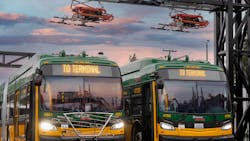FTA awards nearly $1.7 billion in bus grants across two federal programs
The Federal Transit Administration (FTA) has awarded nearly $1.7 billion to 130 projects in 46 states and territories that will modernize bus facilities and purchase new vehicles that produce less or no emissions.
The grants are provided through two federal programs: The Low or No Emission (Low-No) Program and Grants for Buses and Bus Facilities Program. This is the second round of grants under the Infrastructure Investment and Jobs Act (IIJA), which provides $5.5 billion for the Low-No Program and $2 billion for the Buses and Bus Facilities program over a five-year period. The first round awarded $1.66 billion to 48 states and territories through the two programs.
FTA reports the first round of the Buses and Bus Facilities and Low-No Grants under the IIJA put approximately 1,800 buses on the road, with more than 1,100 of those using zero-emissions technology. Nearly half of the 1,700 buses this round of funding covers will include zero-emissions vehicles, which more than doubles the number of zero-emission transit buses in the U.S.
“Every day, over 60,000 buses in communities of all sizes take millions of Americans to work, school and everywhere else they need to go,” said U.S. Transportation Secretary Pete Buttigieg. “Today’s announcement means more clean buses, less pollution, more jobs in manufacturing and maintenance and better commutes for families across the country.”
In addition to supporting the transit industry’s wider move toward greener technology, the projects awarded grants also include workforce development plans. Grant recipients can use up to half a percent of their requested grant award toward workforce development activities. FTA says priority consideration was given to those projects that included training elements in the application through either labor-management training partnerships or through the use of registered apprenticeship training.
FTA says 22 of the funded projects will operate with project labor agreements to ensure their efficient and timely completion and 34 projects have committed to the gold standard model of registered apprenticeship, with supportive services such as childcare for employees. In addition, the zero-emission bus grants include millions of dollars in funding for workforce programs that will train internal combustion mechanics to become electric motor technicians.
FTA also notes several grant recipients have pledged to purchase standardized buses and vans. FTA explains that by avoiding customization, grant recipients can lower cost and see their new vehicles delivered faster.
FTA has developed a data visualization tool for the grants, which can be accessed here.
About the Author

Mischa Wanek-Libman
Group Editorial Director
Mischa Wanek-Libman is director of communications with Transdev North America. She has more than 20 years of experience working in the transportation industry covering construction projects, engineering challenges, transit and rail operations and best practices.
Wanek-Libman has held top editorial positions at freight rail and public transportation business-to-business publications including as editor-in-chief and editorial director of Mass Transit from 2018-2024. She has been recognized for editorial excellence through her individual work, as well as for collaborative content.
She is an active member of the American Public Transportation Association's Marketing and Communications Committee and served 14 years as a Board Observer on the National Railroad Construction and Maintenance Association (NRC) Board of Directors.
She is a graduate of Drake University in Des Moines, Iowa, where she earned a Bachelor of Arts degree in Journalism and Mass Communication.
